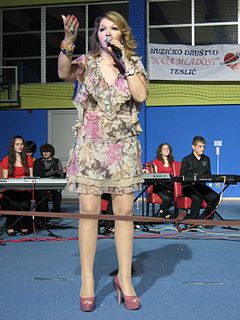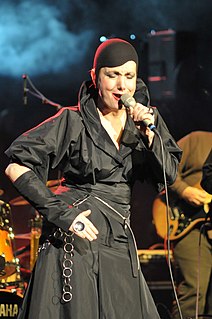
Radio Television Pink is a popular, privately owned, national TV network in Serbia. Pink is the leading commercial station in the Serbian television broadcast market. TV Pink has gained a strong reputation for its entertainment programming. The station offers a compilation of international/domestic movies, American sitcoms, dramas and Latin telenovelas, as well as locally produced talk/variety shows, and lately domestic sitcoms and reality shows.
No Name was a Montenegrin boys band, best known for the controversies surrounding their participation in the national pre-selection for the Eurovision Song Contest. The group made its debut in 2005, with the song "Zauvijek moja", winning the 2005 Europjesma and thus representing Serbia and Montenegro in the Eurovision Song Contest 2005. The group fared 7th in the ESC with a total of 137 points, succeeding in obtaining the straight pass to the final of the Eurovision Song Contest 2006 for Serbia and Montenegro. It was founded in 19 November 2003.

Danilo Stojković, commonly nicknamed Bata (Бата), was a Serbian theatre, television and film actor. Stojković's numerous comedic portrayals of the "small man fighting the system" made him popular with Serbian and ex-Yugoslav audiences, most of them coming in collaborations with either director Slobodan Šijan or scriptwriter Dušan Kovačević, or both.
Colonia is a Croatian dance music duo from Vinkovci, Croatia. They have released twelve albums and over 35 singles to date with various songs and albums gaining platinum status. They are known for winning the first ever Eurodance competition in 2001 and their various hits throughout the years.

Neda Ukraden is a Serbian pop singer born in Croatia, grew up in Bosnia and Herzegovina and is currently living in Serbia. Her professional career stretches back to 1967.
Olivera Katarina, also previously known as Olivera Vučo and Olivera Šakić, is a Serbian actress, singer and writer. She was one of the leading stars of Yugoslav cinema in the 1960s and the 1970s, and is probably the best known for her performance in Aleksandar Petrović's film I Even Met Happy Gypsies (1967), which won the Grand Prix at the 1967 Cannes Film Festival.

Priča o ljubavi obično ugnjavi is the ninth studio album from Serbian and former Yugoslav rock band Riblja Čorba, released in 1988.
Miroslav "Vicko" Milatović is a Serbian musician best known as the drummer for the Serbian and former Yugoslav rock band Riblja Čorba.

Bez Ljubavi is the second studio album from Serbian pop singer Marija Šerifović. The album was recorded in 2005 but released in 2006.

Miroslav "Miša" Aleksić is a Serbian musician, best known as the bass guitarist for the Serbian and former Yugoslav rock band Riblja Čorba.

Radislav "Rajko" Kojić was a Serbian and former Yugoslav guitarist best known for his work with band Riblja Čorba.

Andrej Babić is a Croatian songwriter who has written many Eurovision songs since 2003. He has written songs for four countries: Croatia, Bosnia and Herzegovina, Slovenia and Portugal.

Josipa Lisac is a Croatian pop-rock singer.

Male priče o velikoj ljubavi is the fourth studio album by Yugoslav rock band Zabranjeno Pušenje released in 1989. It's released through Diskoton in SFR Yugoslavia. This was the last album before splitting up of the band in early 1990.
Dubrovački trubaduri was a Yugoslav beat, folk and pop band from Dubrovnik formed in 1961 by Đelo Jusić, main composer, guitar and mandolin player and leader of the group. They were very popular in former Yugoslavia during the 1960s and 1970s for their mixture of pop music and medieval folk traditions of their native ancient city on the Adriatic coast. Internationally also known as 'Dubrovnic Troubadours or The Troubadours Of Dubrovnik, they enjoyed brief popularity across Western Europe having appeared at the 1968 Eurovision Song Contest in London. Their song "Jedan dan" was performed by their singers Luciano Kapurso and Hamo Hajdarhodžić and it scored 7th position. Their other major hits include "Dok Palme Njišu Grane" from 1971, and the Italian-influenced "Noćna Muzika" from 1972. The group, in different line-ups, existed until the early 1980s when they broke up.
Dražen Zečić is a Croatian singer-songwriter. He was born in Split in 1967.

Most Ljubavi is a pedestrian bridge in Vrnjačka Banja, Serbia. It is known as the earliest mention of the love padlocks tradition, where padlocks are left on the bridge railing by couples as sign of their everlasting love. It is one of the famous landmarks of Vrnjačka Banja, and it is the best known among the town's 15 bridges.

Zumreta Midžić known by her stage name Zuzi Zu is a popular Bosnian artist: singer, musician and songwriter. She performs various music genres from pop-rock to Bosnian folk - sevdalinka and Gypsy music. She was born in Velika Kladuša, Bosnia and Herzegovina and for many years she was living and working in Sarajevo.
Fahrudin Pecikoza is a Bosnian songwriter. He has written lyrics for Bosnian, Croatian and Serbian singers.














